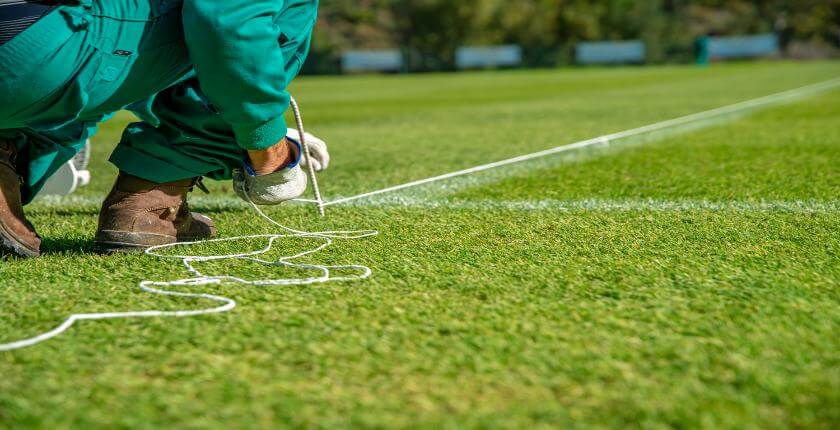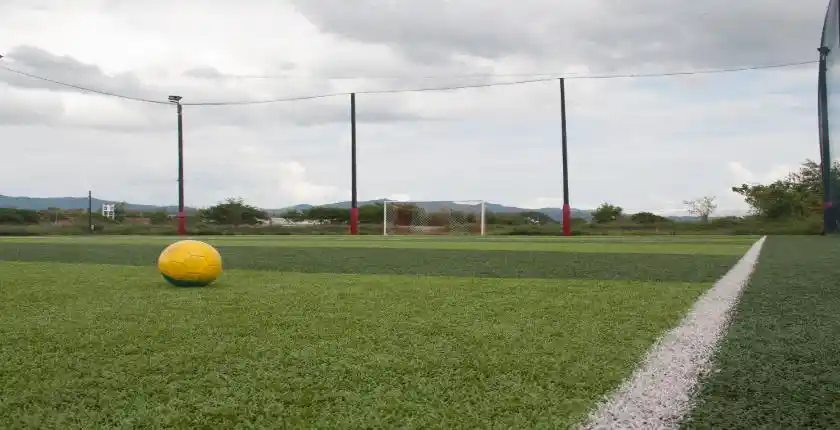
Synthetic Football Pitch Cleaning
Enquire Today For A Free No Obligation Quote
At Synthetic Football Pitch Cleaning, we specialise in maintaining clean, safe, and high-performance artificial football surfaces across the UK and surrunding areas.
Whether it’s a full-size 3G facility, a school training pitch, or a multi-use synthetic indoor field or MUGAs, our cleaning services ensure reliable traction, consistent drainage, and a professional finish all year round.
What Equipment is Needed For Synthetic Pitch Cleaning?
To effectively clean a synthetic football pitch, a variety of specialized equipment is required to ensure optimal maintenance and longevity of the surface. Key tools include a mechanical brush or rotary brush machine, which helps to agitate and remove debris from the fibers of the turf. A vacuum system is also essential for extracting dirt, leaves, and other contaminants that can accumulate over time.
Additionally, a high-pressure water system may be used for deep cleaning, particularly to flush out infill materials and eliminate stubborn stains. For routine maintenance, a leaf blower can assist in clearing loose debris quickly.
Lastly, eco-friendly cleaning solutions specifically formulated for synthetic surfaces are recommended to maintain hygiene without damaging the turf.
What Is Included In Synthetic Football Pitch Cleaning Services?
Professional synthetic football pitch cleaning begins with the removal of litter and surface debris through sweeping or vacuuming. This is followed by intensive brushing to lift compacted fibres and evenly redistribute infill across the surface.
For artificial systems, we carry out deep grooming or power cleaning to remove embedded dirt and restore fibre uprightness.
Treatments for grass, moss, algae, and weeds are applied as required, and we clean pitch perimeters and drainage channels to maintain efficient water flow. Spot infill replenishment and small-scale sports surface repairs are included where necessary.
What Types Of Football Pitches Require Cleaning?
Different types of synthetic football pitches benefit from tailored cleaning to ensure safety and longevity, including:
- 3G synthetic turf – Rubber crumb infill systems require brushing and contaminant removal to avoid compaction.
- 4G and 5G artificial turf systems – High-spec fibre technologies; benefit from specialist cleaning to retain performance and structure.
- Sand-based synthetic turf – Found in schools and public venues; needs infill levelling and biological growth control.
- Indoor synthetic pitches – Require dust removal, sanitation, and surface checks suitable for enclosed environments.
What Maintenance Should be Done After Cleaning the Pitch?
After cleaning a synthetic football pitch, it is essential to perform several sports surface maintenance tasks to ensure the longevity and performance of the surface.
First, a thorough inspection should be conducted to identify any damages or wear, particularly in seams and infill levels. Next, it’s crucial to re-distribute the infill material evenly across the pitch to maintain proper shock absorption and traction. Following this, a grooming process using a specialized brush can help lift the fibers of the turf, ensuring they remain upright and resilient.
Additionally, applying a UV protectant can be a protective measure to safeguard the synthetic fibers from sun damage and fading. Finally, regular monitoring of drainage systems should be performed to prevent water accumulation and promote optimal playing conditions.

How Much Does Synthetic Football Pitch Cleaning Cost?
Light synthetic football pitch cleaning, such as surface brushing and basic debris clearing, starts at £200 per session.
Full deep-cleaning services, including decompaction, power grooming, and specialist treatments, range from £1,000 to £3,000, depending on pitch type, size, and condition. Infill top-ups and surface rejuvenation are priced separately, tailored to the specific needs of your facility.
Approximately 45% of synthetic pitch maintenance costs are associated with cleaning and upkeep activities each year. S
Contact Synthetic Football Pitch Cleaning to get customised prices for cleaning services of synthetic football pitches.
What Are The Benefits Of Regular Cleaning of Synthetic Football Pitch?
Routine synthetic football pitch cleaning provides multiple benefits, including:
- Enhanced ball roll and surface performance – Ensures smooth, consistent play.
- Improved player safety – Reduces injury risks caused by compacted infill or slick spots.
- Optimised drainage – Helps eliminate puddling and prevents flooding.
- Better presentation – Maintains a clean, professional appearance for users and visitors.
- Longer pitch lifespan – Reduces the need for early resurfacing or extensive repairs.
- Reputation boost – A well-kept pitch reflects positively on clubs, schools, and facility operators.
What are Common Mistakes in Cleaning Synthetic Pitches?
Common mistakes in cleaning synthetic pitches often include using the wrong cleaning agents, such as harsh chemicals that can damage the fibers and backing of the turf.
Additionally, neglecting to regularly remove debris like leaves, dirt, and litter can lead to the accumulation of organic matter, which promotes mold growth and can affect the pitch’s drainage capabilities. Another frequent error is failing to properly groom the surface; this includes not brushing the infill material or allowing it to compact over time, which diminishes the performance and safety of the pitch.
Lastly, many facilities overlook the importance of regular inspections for wear and tear, leading to prolonged issues that could have been easily addressed with timely maintenance.
How Often Should A Synthetic Football Pitch Be Cleaned?
Synthetic football pitch cleaning should follow a set routine, such as a weekly brushing for busy pitches, to prevent fibre matting and infill shift.
Monthly sweeping and edge clearing help control debris buildup. Deep cleaning is advised every 3 to 6 months to maintain drainage and fibre structure. While full rejuvenation, including infill renewal, is typically needed every 1 to 3 years, depending on wear and environmental conditions.

Can Weather Conditions Affect Pitch Cleaning?
Yes, weather conditions can significantly affect synthetic football pitch cleaning. Rainy weather can help to naturally rinse away dirt and debris, reducing the frequency of mechanical cleaning needed; however, it can also lead to muddy conditions that may require more intensive cleaning afterward. Conversely, hot and dry weather can cause dust and pollen to accumulate on the pitch, necessitating regular maintenance to prevent surface degradation and ensure optimal playing conditions.
Additionally, extreme temperatures can impact the effectiveness of certain cleaning agents, as they may evaporate too quickly or not activate properly in cold conditions. Therefore, understanding local weather patterns is crucial for developing an effective pitch cleaning schedule that maintains the quality and longevity of synthetic surfaces.
What is the Best Method for Cleaning Synthetic Football Pitches?
The best method for cleaning synthetic football pitches in 2025 involves a combination of advanced mechanical and chemical techniques designed to maintain the integrity of the turf while ensuring optimal playing conditions.
Initially, a specialized rotary brush machine equipped with soft bristles is employed to remove surface debris such as leaves, dirt, and rubber granules that can accumulate over time.
Following this, an eco-friendly cleaning solution, specifically formulated for synthetic surfaces, is applied using a low-pressure spray system to break down any stubborn stains or contaminants. This solution not only cleans but also sanitizes the pitch, eliminating harmful bacteria and fungi.
Finally, a thorough rinsing with warm water helps to wash away any residual cleaning agents, leaving the pitch clean and safe for players.
What Are Signs Your Synthetic Football Pitch Needs Cleaning?
Signs that a synthetic football pitch requires cleaning include:
- Compacted or flattened turf fibres – Indicate insufficient brushing and overuse.
- Irregular ball behaviour or surface unevenness – Caused by infill displacement or compaction.
- Water pooling – Suggests blocked drains or saturated infill.
- Algae or moss growth – Shows high moisture levels and poor maintenance.
- Unpleasant odours – Often linked to bacterial buildup or organic decay.
- Visibly dirty or stained surface – Indicates the need for professional cleaning intervention.
What are Common Mistakes in Cleaning Synthetic Pitches?
Common mistakes in cleaning synthetic pitches include using inappropriate cleaning agents, such as bleach or harsh detergent chemicals that can damage the turf fibers and infill material. Another frequent error is neglecting to remove debris regularly; failing to clear leaves, dirt, and other organic matter can lead to mold growth and a decline in the pitch’s performance.
Additionally, using heavy machinery or aggressive scrubbing techniques can cause wear and tear on the surface, leading to premature aging of the pitch. Lastly, not following a proper maintenance schedule often results in inadequate cleaning, which can affect player safety and overall playability. Regular inspections and employing specialized equipment designed for synthetic surfaces are essential to avoid these pitfalls.
Is Synthetic Football Pitch Cleaning Safe For Artificial Surfaces?
Our synthetic football pitch cleaning methods use purpose-built, non-abrasive machinery designed to protect artificial turf.
We avoid harsh or corrosive chemicals and apply eco-friendly treatments to manage moss, algae, and odour safely. All cleaning solutions and equipment are compliant with industry standards to ensure player safety and preserve the integrity of the synthetic surface.
Who Can Advise on The Best Practices For Pitch Care?
For optimal pitch care, consulting with a variety of experts can provide valuable insights. Groundskeepers with experience in synthetic surfaces are essential, as they possess specialized knowledge about the materials and maintenance techniques specific to artificial turf.
Additionally, sports facility managers often have practical experience and can share best practices based on their operational needs. Engaging with manufacturers of synthetic turf can also be beneficial, as they typically offer guidelines tailored to their products.
Furthermore, industry organizations such as the Synthetic Turf Council provide resources and training programs that focus on pitch maintenance standards. Lastly, seeking advice from environmental specialists can help ensure that cleaning methods are sustainable and safe for both players and the surrounding ecosystem.
Contact Synthetic Football Pitch Cleaning for tailored, sustainable cleaning services that keep your artificial pitch performing at its best.
Find More Info
Make sure you contact us today for a number of great synthetic football pitch cleaning services.
For more information on synthetic football pitch cleaning, fill in the contact form below to receive a free quote today.
★★★★★
“Their synthetic football pitch cleaning service has completely transformed our facility. The turf looks refreshed, drains better, and feels much safer to play on.”
Alistair Penmana
Greater London
★★★★★
“We booked them for a full clean of our synthetic football pitch, and the results were outstanding. Debris, moss, and compaction were all thoroughly dealt with.”
Helena Farncombe
Greater London